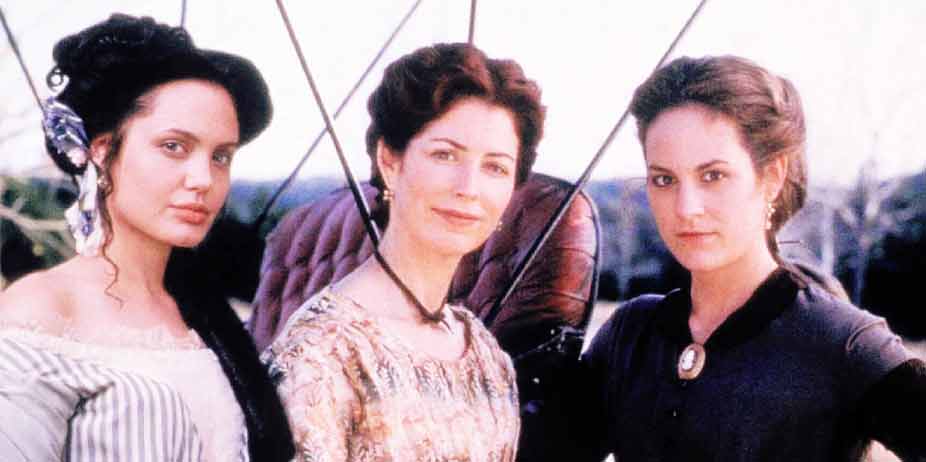
True Women (1997)
Based on the book by Janice Woods Windle about the women of her family during the Civil War era, True Women is both a homage to women throughout the ages and a declaration of feminist independence. It's an engrossing story about survival and hardship that also manages to be touching, but does have an unhealthy share of depressing elements. Worthwhile for older viewers willing to navigate its flaws but hardly what you'd choose for a light afternoon's watch.
The story begins on a Georgian plantation in the mid-eighteen hundreds. Euphemia (Tina Majorino) is the cousin and best friend of Georga (Rachael Leigh Cook) and has been living with them since the death of her mother. When her father has a heart attack and dies coming to fetch her, she's sent to live with her older sister Sarah (Dana Delany) in Texas. Her husband Bartlett (Powers Boothe) is a Ranger. Their lives are constantly in turmoil as the Indians attack neighboring ranches and families. Georgia has promised to write "Pheemy" every day, but her life takes an unexpected turn. Noted as remarkable for her beautiful dark features, she comes to the understanding that her grandmother was an Indian princess. In the south prejudice runs rampant toward "half-breeds," and their plantation is attacked and barn burned down by local racists. One of their negro slaves has an Indian wife who is cruelly murdered. Georgia's father wants to move them to Texas and safety but her mother refuses to run. All of this is poured out to Pheemy in a letter that never reaches its destination. Both girls believe the other has abandoned them and thus grow apart.
Years later, Pheemy (Annabeth Gish) and Georgia (Angelina Jolie) will be brought back together again. They will face the Civil War, births, deaths, hardships, and trials. Each woman will leave her mark on history and learn to embrace life as a "true women of the west," through marriage, illness, and difficulties... issues about slaves, the death of children, and even the women's movement and the right to vote. For the most part this miniseries is breathtakingly filmed, well-acted, and gorgeously produced with lots of eye candy for the eager viewer. It's also historically correct in the sense that it's not one-sided. We see there are good and bad Indians alike, that some men are honest and compassion and others are cruel and unjust. The only imbalance comes from the presence of a Yankee officer, who is portrayed as a sexist pig and tries to molest the ladies of the house. The characters are likable and flawed, which makes them seem all the more realistic. Pheemy deals with prejudice but learns to forgive. Sarah survives despite incredible odds. The scene where she fearlessly marches out into a group of hostile Indians to rescue one of the girls is outstanding. Georgia learns to repress her independence and find enjoyment in motherhood.
There's a lot to like about the story and the women involved, but unfortunately just like the novel, it does have rough spots. Two scenes of sexual content pop up unexpectedly, one of them with shadowed nudity. We see Georgia's bare back as she gets up out of the tub. There are many references to the marriage bed and making love. Georgia questions why "so much pleasure could cause so much pain" (in reference to the hardships of childbearing). Twice overtures are made to females... an Indian promises Sarah that if she "comes to his bed," he will not harm the other girls. The Yankee officer who takes over Georgia's house lusts after her eldest daughter and asks that she come to his bed. When Georgia refuses, he attempts to rape her. She is shoved down onto the bed and her blouse torn open before he collapses in a coughing fit (he has consumption). Her daughter then lures him into the barn with a veiled overture and he takes off his coat while she unlaces her bodice. Nothing more happens between them. One man is shot and killed in cold blood; his murder is covered up by the ladies. Men are killed in battle, shot with arrows, whipped, and punched. A woman is graphically hanged after her husband is killed. One minor character is kidnapped by Indians and returns with her face badly scarred; she alludes to sexual abuse while held captive.
There are also many mild profanities, and some blasphemy. Georgia calls God "a d*mn fool" for plighting women with childbearing, but her husband reprimands her on it. Questions are raised about whether or not God is just in allowing men to suffer, but never answered. Emotional issues involve the death of children, a woman dying giving birth (a child witnesses it), slavery, and cold blooded murder. Some of their actions are justified given the nature of their circumstances, but others are unforgivable. One reviewer remarked that "there is a death every five minutes," and this much is true. It's a very bleak look at history. The story is essentially good at its heart, both entertaining and revealing in the sense that it gives us a glimpse of true women fighting for what they believed. But the inclusion of sexual content makes it unsuitable for family viewing.
